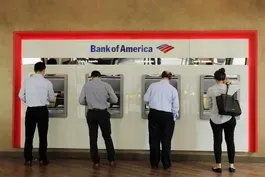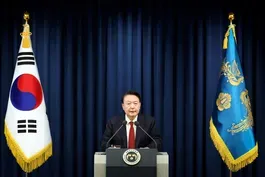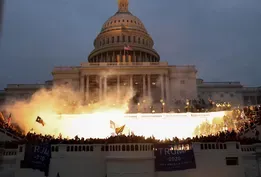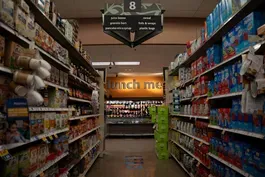
Syrians describe living in crossfire of brutal civil war
Clip: 12/3/2024 | 7m 23sVideo has Closed Captions
Syrians describe living in the crossfire of a brutal civil war for 13 years
Since Syria's “Arab Spring,” protests devolved into a decade-plus bloodletting. Fleeing civilians have been caught in the crossfire between the Assad regime, its Russian and Iranian allies and the various opposition groups that have fought against them. As the conflict reignites, special correspondent Leila Molana-Allen reports on the victims of this war and its survivors.
Problems with Closed Captions? Closed Captioning Feedback
Problems with Closed Captions? Closed Captioning Feedback
Major corporate funding for the PBS News Hour is provided by BDO, BNSF, Consumer Cellular, American Cruise Lines, and Raymond James. Funding for the PBS NewsHour Weekend is provided by...

Syrians describe living in crossfire of brutal civil war
Clip: 12/3/2024 | 7m 23sVideo has Closed Captions
Since Syria's “Arab Spring,” protests devolved into a decade-plus bloodletting. Fleeing civilians have been caught in the crossfire between the Assad regime, its Russian and Iranian allies and the various opposition groups that have fought against them. As the conflict reignites, special correspondent Leila Molana-Allen reports on the victims of this war and its survivors.
Problems with Closed Captions? Closed Captioning Feedback
How to Watch PBS News Hour
PBS News Hour is available to stream on pbs.org and the free PBS App, available on iPhone, Apple TV, Android TV, Android smartphones, Amazon Fire TV, Amazon Fire Tablet, Roku, Samsung Smart TV, and Vizio.
Providing Support for PBS.org
Learn Moreabout PBS online sponsorshipSince Syria's own Arab Spring protests there have devolved into a decade plus bloodletting.
Fleeing civilians have been caught in the crossfire between the Assad regime, its Russian and Iranian allies and various opposition groups.
Now, the conflict has reignited in northwest Syria as Idlib and Aleppo provinces, principally before this new offensive began.
Special correspondent Laila Milana Allen traveled there to meet some of the victims of this war and its survivors who are.
A brutal return to the bloodiest days of the Syrian civil war, as allied Syrian rebel forces surged from the country's rebel held northwest enclave to seize the country's second city, Aleppo.
In a matter of hours.
But as rebels continue to push their way towards the heart of the country, its civilians back in Idlib and Aleppo bearing the terrible brunt of Syrian President Assad's retaliation as his allies and Russian warplanes double down on their bombardment.
Trapped by Syrian forces on one side and the Turkish border on the other.
More than 4 million destitute grieving civilians languish in despair.
Families here in the rebel held northwest have been under assault from Syrian and Russian forces for years, suffering in silence.
Many of the young children born here don't know a life without the sound of bombs and bullets.
We're just a few miles from the front line here and the tens of thousands of civilians living in these areas so close to Syrian regime territory face the constant threat of both shelling from regime forces and air strikes carried out by Russian warplanes.
When tensions are high, they're sometimes attacked every few days.
Many of those living here have already been displaced.
Once, twice, half a dozen times by this bitter and brutal civil war.
They tell me they fear they don't belong anywhere.
Now that Syrian passports blocked by much of the world stop them from traveling anywhere except back to regime held Syria where they fear imprisonment or death.
They build their lives around the threat of attack bags full of essentials ready to run, and little effort to build more than rough shelters.
Fearing that temporary homes may be destroyed as well.
Amir has seven children displaced from their home village of right hand by Syrian government forces five years ago.
His extended family packed their eight families inside this water tower complex in an abandoned area for shelter, thinking they would be safe.
They were wrong.
The kids were sleeping.
Then we heard a loud bang, a bang, then fire, shrapnel and falling stone.
Their shelter was under attack from a Russian warplane.
It was very, very scary.
We didn't know which way to go.
The kids were screaming.
We ran to the mountains.
Then I started screaming, screaming for my dad and my nephew.
Amir's father and his six year old nephew were killed in the attack.
We are always afraid.
We've been scared for 13 years.
Not just this year.
We live in fear.
The jets are always targeting civilians.
With little outside help.
Under relentless attack, local volunteers from the Syrian Civil Defense Force, better known as the White Helmets, continue to do what they can.
Hassan came running the night Amir's shelter was hit and miss.
At the scene we found was brutal and so painful.
People were running around in terror.
Everyone was in a state of panic because of the bombing and fear in case of a second bombing.
When our team arrived, we found bodies lying around.
The victims hit by the aircraft that bombed the station.
There was a child who'd been killed.
It was devastating.
His body was covered in dust and his face to a wall hit by the bombs had collapsed on top of him.
And the volunteers risk the regular practice of double tap attacks when forces wait for rescuers to arrive before unleashing a second strike to rescue who they can.
.
Hassan fears this will never end.
By day, they bury their neighbors by night.
The attacks begin again.
For those who survive the road to recovery, with no home to return to is far from certain.
Thousands of patients beg the Turkish authorities to let them cross.
To get medical treatment they can't get here.
Few are given permission.
Mohammad is one of the lucky ones.
He made it across the border to the House of Healing in Gaziantep, a medical center for displaced Syrians run by NGO.
The Syrian Emergency Taskforce.
When Mohammad was just two years old, his home in Aleppo was hit by a Russian airstrike.
His aunt and grandmother were both killed.
The bomb hit the building's gas tank and baby Mohammad's entire body was burned under him.
He suffers from burns in his lungs, from constant infections, and suffers from weakness in walking due to intensive nerve damage from the burns.
Just desperate to save his son, Ali smuggled the family into rebel held territory.
Then he began trying to get him to Turkey for further treatment.
Now, seven, Mohammad has been waiting years for the surgeries He needs to correct his agonizing injuries.
There's little more doctors can do for his face.
His father hopes next they'll be able to separate his fingers fuzed together by the flames.
Mohammad has never been to school.
He's spent his whole life waiting for painful operations.
Excluded since infancy.
He sits.
Alone, playing silently in darker moments, he begs his father to find a way to help him make friends.
The children at the displacement camp wouldn't stand near my son or talk to him.
They were afraid of the shape of his face.
So he remained isolated in the camp and wouldn't leave his tent.
Because when the children saw him, they would be afraid of him.
Just one family member is allowed to accompany a patient across the border.
Ali's wife and their three other children wait in a makeshift displacement camp with no breadwinner and little means to survive.
Mohammad hasn't seen his mother in more than two years.
She knows my family is living in a difficult situation in Syria.
They have no one to support them.
They were alive simply because they have not died.
Mohammad now has permission to have surgery in Turkey, but the costs aren't covered.
His next operation will cost $450.
Nearly a year of average wages in northwest Syria.
For those who can find work across this beleaguered pocket of the world, frozen in time and misery.
Millions more children spend their days in a forgotten limbo, deprived of education for much of their young lives.
The earliest lesson they've learned is the harshest not to hope that help is coming.
For the PBS NewsHour, I'm Leila Milana.
Allam in Idlib, northwest Syria.
Bank of America CEO on economy and Trump's second term
Video has Closed Captions
Clip: 12/3/2024 | 9m 28s | Bank of America CEO on interest rates, tariffs and Trump's second term (9m 28s)
South Korea in political chaos with martial law attempt
Video has Closed Captions
Clip: 12/3/2024 | 7m 43s | South Korea's president throws nation into political chaos with martial law attempt (7m 43s)
What Trump’s return to power will mean for Jan. 6 rioters
Video has Closed Captions
Clip: 12/3/2024 | 6m 19s | What Trump’s return to power will mean for Jan. 6 rioters (6m 19s)
Why so many Americans are dissatisfied with a solid economy
Video has Closed Captions
Clip: 12/3/2024 | 7m 33s | Why so many Americans are dissatisfied with the seemingly solid economy (7m 33s)
Providing Support for PBS.org
Learn Moreabout PBS online sponsorshipSupport for PBS provided by:
Major corporate funding for the PBS News Hour is provided by BDO, BNSF, Consumer Cellular, American Cruise Lines, and Raymond James. Funding for the PBS NewsHour Weekend is provided by...














